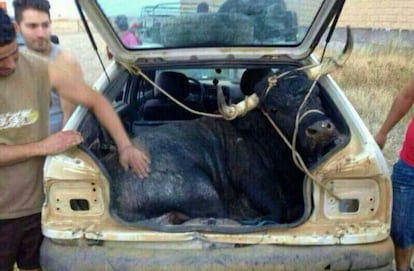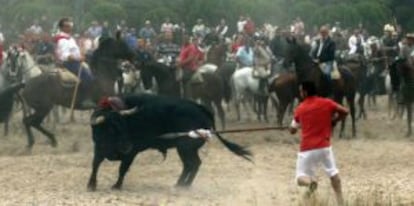Spain’s celebrations of cruelty
Dozens of towns continue to brutally mistreat animals as part of festivals rooted in religious holidays

The last goat to be thrown from the church bell tower in Manganeses de la Polvorosa, in the northwestern province of Zamora, as part of its annual festivities was called Chillerona. The animal was named after Alfonso Chillerón, the president of the ANPBA animal rights association, who had spent years fighting the tradition, arguing that although the animal was caught in a blanket, it was being subjected to needless stress. That was in 2001, a decade after the first ban was imposed: a victory for animal rights, but also a reflection on how slowly attitudes to animal welfare are improving in Spain.
Nowadays in Manganeses de la Polvorosa, villagers throw a life-size replica of a goat from their bell tower. Other animal rights successes mean that the inhabitants of Toro de Coria, in Cáceres, no longer throw darts at a bull once a year. But in Toro de la Vega, in Valladolid, as in many other communities around Spain, animals continue to be brutally mistreated as part of traditional festivals.
Environmentalist and animal rights groups say that Spain’s legislation still largely fails to protect animals, and that fines do little to help. In many communities, where festivals include inflicting injury and death on animals, residents collect donations to pay financial sanctions.
In Ohanes, Almería, a bull is tied up and forced to bow eight times before the statue of a saint
Luis Gilpérez, deputy president of the Andalusian Association for the Defense of Animals, says regional governments need to make cruelty fines much heftier if they are to work: “In the case of Cazalilla, in Jaén, where a turkey is still thrown from the bell tower of the church, the regional government imposes a fine of €2,001, the minimum; the maximum is €30,000.”
Nuria Menéndez, head of the Observatory for Animal Justice and Defense, says her organization’s approach is always to contact the local council. “But they very rarely take any notice. Even when they agree with us, they say they daren’t go against tradition for fear of losing votes.” In the case of Cazalilla, the organization has decided to change tactics. “Next year we’re going to file a complaint against the Church authorities. The turkey is thrown out of a church bell tower after all. And most of these festivals are religious in origin.”
Many festivals involving animal abuse are protected by a 2006 law that allows them to claim they are of “touristic interest”. The law supposedly excludes events involving the mistreatment of animals, but only in the case of communities that applied after 2006.
The opposition Socialist Party, with the support of other left-leaning groups in parliament, has presented a series of proposals that would see the passing of a law to ban such activities once and for all throughout the country. “A society’s development is also measured by the respect shown to animals. We want an end to the situation whereby animal cruelty is banned in one region but not another,” says Socialist Party secretary general Pedro Sánchez.

Silvia Barquero, head of PACMA, a political party that supports animal welfare, says Spain’s calendar of cruel festivals is unique in the EU, and is damaging the country’s branding internationally.
Bull taunting. Each November, in Medinaceli, Soria, crowds tie a bull to a post, tie cloths soaked in petrol to its horns and set light to them. It is then released and beaten and corralled around the town. Every summer in Denia, Alicante, and L’Ampolla, Tarragona, bulls are chased off a pier, and then dragged out of the sea. In Villapando, Zamora, a bull is pursued by a range of motor vehicles. In Benavente and Fornalutx, Mallorca, bulls are chased around by a crowd wielding sticks. In Ohanes, Almería, a bull is tied up and forced to bow down eight times before the statue of a saint …
Decapitating geese. In Carpio del Tajo, Toledo, the annual summer festivities include horse riders trying to pull the head of a goose that has been strung up. Up until 20 years ago, the geese were alive. The same tradition continues in the Basque town of Lekeitio, except that the geese are hung up over water. This year rubber geese were used for the first time.
Pigeon stoning. In the rural community of Robledo de Chavela, in northwest Madrid, Easter is celebrated by stoning to death pigeons that have been forced into jars.
Duck hunting. In Valdés, Asturias, and Sagunto, Valencia, ducks are released into the sea, where a race ensues to capture them. After years of fines, Sagunto town council hired a vet to oversee the event.
Fire walking. In San Bartolomé de Pinares, Ávila, and Alosno, Huelva, horses, donkeys and mules are forced to jump over bonfires or to walk on burning coals.
Drugged oxen. In Erandio, Vizcaya, huge stones are tied to oxen, which are then forced to drag them across fields. Two animals died this year after they were given drugs to improve their performance.
“If they tried to stop the turkey throwing, people would riot”
Juan Balbín Garrido has been the mayor of Cazalilla, in Jaén, for 19 years. In 2002, the regional government of Andalusia banned the community from throwing a live turkey from the church bell tower. Since then, the practice has continued every summer. The Socialist Party mayor says that he has “no means to stop it,” while admitting that the authorities do not even bother to close the door to the tower to prevent residents from throwing the animal out.
“It’s impossible to prevent them from throwing it off. There are no police here. I can’t put 100 riot police in front of the bell tower, because I don’t have them, and also because to stop a stupid thing from taking place would lead to bigger problems: people would riot if I called in the Civil Guard. I know how people feel in this village, and the animal doesn’t suffer anything.”
He explains that local people club together to pay the €2,001 fine that the regional government imposes each year on the person given the honor of throwing the animal off the bell tower. “It’s not nice to have to hand over the fine,” says the mayor. He refuses to say whether he has contributed money to the fund. “I’m sure you can guess the answer.”
Balbín says he has never thrown a turkey from the bell tower himself, but not out of respect for the animal’s welfare: “I have passed up the privilege so that other people can enjoy it.”
He believes that the regional government’s ban is “unfair,” despite his party supporting it, saying that his loyalty is to his local community. He is, however, opposed to the bull-baiting that takes place in Toro de la Vega, Valladolid, each September: “It’s very dangerous, people could get hurt. Sometimes we forget about people and put too much emphasis on the animal.”
Tu suscripción se está usando en otro dispositivo
¿Quieres añadir otro usuario a tu suscripción?
Si continúas leyendo en este dispositivo, no se podrá leer en el otro.
FlechaTu suscripción se está usando en otro dispositivo y solo puedes acceder a EL PAÍS desde un dispositivo a la vez.
Si quieres compartir tu cuenta, cambia tu suscripción a la modalidad Premium, así podrás añadir otro usuario. Cada uno accederá con su propia cuenta de email, lo que os permitirá personalizar vuestra experiencia en EL PAÍS.
¿Tienes una suscripción de empresa? Accede aquí para contratar más cuentas.
En el caso de no saber quién está usando tu cuenta, te recomendamos cambiar tu contraseña aquí.
Si decides continuar compartiendo tu cuenta, este mensaje se mostrará en tu dispositivo y en el de la otra persona que está usando tu cuenta de forma indefinida, afectando a tu experiencia de lectura. Puedes consultar aquí los términos y condiciones de la suscripción digital.









































